Sustainability and Local Food Talk by Marion Nestle and Alice Waters
Marion Nestle and Alice Waters came to UC Berkeley to present a talk about the importance of sustainability and the farm to table local food movement. I was lucky to get to attend! The event was put on by the UC Berkeley School of Public Health and the Berkeley Food Institute, which is working on a graduate certificate program in food sustainability among other projects. Woohoo to so many amazing entities all in one room.Who are they? Well, Alice Waters is the founder and owner of the very first farm to table restaurant, Chez Panisse, in Berkeley, California, which buys all of its produce from the Le Canard Farm in Sonoma. But she has done much more than starting a successful (and amazing) restaurant. She has brought gardens and delicious sustainable meals to schools. She has helped prisons start gardens. And she has founded the Edible Schoolyard Project and written numerous books. I personally made many of the dishes in her books when I had my career as a pastry chef for Hyatt.Marion Nestle writes a blog, Food Politics, that I read and follow voraciously every day! She is a Paulette Goddard Professor, of Nutrition, Food Studies, and Public Health, Emerita, at New York University, which she chaired from 1988-2003 and from which she retired in September 2017. She is also a Visiting Professor of Nutritional Sciences at Cornell. She earned a Ph.D. in molecular biology and an M.P.H. in public health nutrition from the University of California, Berkeley, and has been awarded honorary degrees from Transylvania University in Kentucky (2012) and from the City University of New York’s Macaulay Honors College (2016). They figured out that she has 4 degrees from UC Berkeley when they were introducing her.The most important thing about Marion is that she not only truly understands how the political systems of food work in the U.S., but she clearly understands how they SHOULD work so the US can have a safe, more healthful food supply that is sustainable and affordable.First of all, a shout out about Marion's new book, Unsavory Truth in her own words:https://www.youtube.com/watch?v=AMhokyoiZTYHer book is coming out in October. But you can preorder it now. I did!Here is a summary transcript of their talk:INTRODUCTION: Alice Waters, "The table is a powerful means to social justice." Food and nutrition professionals cannot ignore that statement. The second quote I resonated with was a statement by the physician from the UC Berkeley School of Public Health (I could not catch her name so if someone knows it please email me and I will update this blog). She stated, "In my practice, I was receiving children who had been spit out of a machine and who were sick and the problem was not that they were sick but that there is a machine creating sick kids. We must turn our eyes to the machine to solve the real problem." The machine is a modern society with too much rich food and a lack of exercise.
The talk was lively, informative, and inspiring and the answers to the question, what got you interested in food?” was easily answered by Marion and Alice.
Alice felt like she had not eaten until she went to France. See her memoir book, Coming to My Senses. The making of her counterculture farm to table movement happened when she reached Paris. It was simply the taste of the watercress soup in her hotel, served with a freshly-baked baguette, which became the most delicious meal she had ever eaten. She was seduced and awakened by her own senses. France was a slow food culture with 2-hour lunches with families with at least 2 hours eating and talking as a family and she loved that value. Dinner was shared for hours at a table every night with no TV. She thought Paris was the most beautiful place in the world. She was inspired by the most beautiful vegetables. Alice was supposed to go to class to speak French and never went. She came home and started a restaurant to start a farm to table and slow food movement here in the US. She wanted access to those ingredients so she could make food as she had in France! And she said she always paid her farmer top dollar and never negotiated because she wanted his kids to go to college and for him to make a decent living.Marion's food choice came when she was sent from her NYC home to a summer camp in Vermont where she got to go out and pick the veggies for dinner. She picked string beans and was completely shocked. Sweet, crisp green beans gave her an awakening because she only had canned beans prior to this moment. She became so interested in food that she chose dietetics and later food policy and public health for her academic path and career. Marion sees the biggest issues of our food system as three major ones:
- Overnutrition from processed food
- Undernutrition from food insecurity and poverty
- Climate change and sustainable farming
Marion defines public health problems as upstream and downstream. She explains that the problems that are upstream are the ones that need to be fixed so they make the problems that are downstream go away.The Farm Bill is one of the biggest "upstream" issues. In her classes, she asks her students to list all of the things the farm bill should do. And when they do make their list it is always great but that is not what the farm bill does. It subsidizes the farmers who grow corn and other cash crops like cotton. The corn feeds the animals and goes into processed food. So the long story short is that most of the food being subsidized makes fast food and processed food really cheap and the fruits and vegetables are more expensive. And the public health issues that arise are very serious especially with obesity and type 2 diabetes. And these problems are being taken to developing countries that want to gobble up the cheap fast food except they do not have the infrastructure to deal with the public health crisis of obesity and type 2 diabetes. I am sure you have all read the CDC statistics on overweight and obesity where over 2/3 of our country is overweight or obese.But Marion and Alice do not just complain. They advise that the real strategy to fight this problem is to go local. By supporting local food growers you support sustainable farming and help increase and improve your local food supply. They promote the farm to school movement, urban gardens, and teaching students the importance of political advocacy for healthy food systems. The moment in time is right now because the issues with climate change and type 2 diabetes and obesity are very serious. So are the issues with hunger and poverty.While some humbugs might say, the kids won't eat it, or it is too expensive, or it is too much trouble, Marion and Alice say everyone wants to eat better and they will if you show them the way and allow them to have the same flavor awakening. Learning how to cook makes food important. Knowing how to cook with veggies and grains and learning the concept of slow food and how our ancestors used to eat is very empowering to people.Marion said kids in low resource communities will make a salad and eat it. 18 of 20 boys were eating salads and the program to grow, cook, and serve food was a great success. She always starts her classes with a list of how the food movement has improved life for everyone: Better food in supermarkets. You can buy beautiful, delicious foods at more farmer’s markets. There is more urban agriculture. The food movement has brought food studies to the universities. Marion sees this as the wave of the future and the good news about food is a force of optimism in a time and world that is not so positive now.Alice explains that the farm to table and local food movement provides a connection to nature along with the motivation and inspiration to cook a delicious meal. While the time to cook is a luxury it is important to start teaching kids how to grow food and cook as part of the school program and this is being done successfully in some places around the country. Alice was able to do it for local schools in the Berkeley area. She helped schools create gardens and teach the kids how to cook and to learn about spices. By studying diets from around the world and learning about different foods, the kids become more engaged with all kinds of foods and enjoyed more fruits and veggies.And here is the most important point that I learned in this fabulous presentation and panel discussion. Marion points out that the department of commerce shows food per capita has increased since 1980 and this is when obesity increased. The cost of fast food and soda has not gone up in price as much as fruits and vegetables. Federal funding reduces the cost of junk food. And the marketing for junk food costs billions of dollars and it is subsidized by tax dollars, which is wasteful and these are policies that should be changed but the government will not fix this right now. The system favors food processing manufacturers. We have to be educated about the farm bill and we have to make the right choices about what we eat. We vote with our food dollars.Marion has one more important point that she teaches her students. She says we should avoid foods that have more than 5 ingredients especially when you do not know what they are. She suggests using CSPI's site for a glossary on food additives as an educational project.Here is another resource by Whole Foods that details the importance of agricultural and land-use diversity from local food sources.Here are more photos:The International House on the UC Berkeley Campus where we gathered to hear the conversations: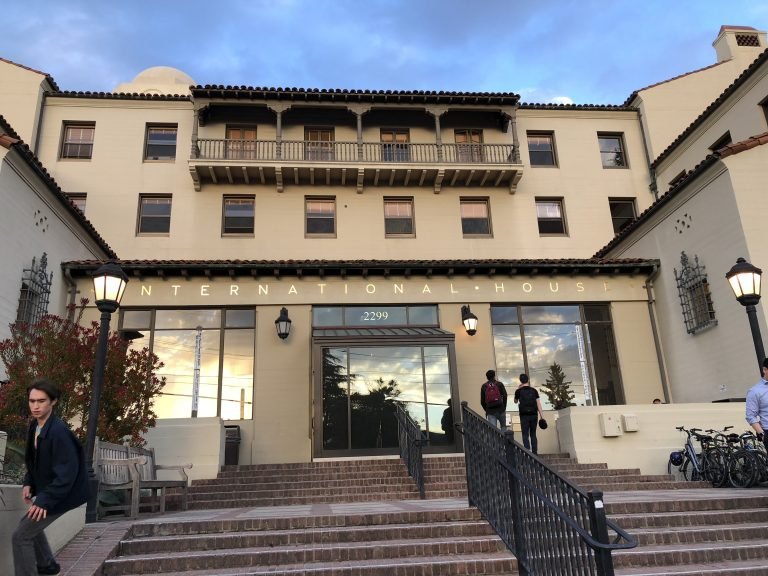 Beautiful UC Berkeley streets and view of the bay from my Uber car driven by a UC Berkeley student of hospitality from Nepal who is excited to go back and help their hotel industry in his country:
Beautiful UC Berkeley streets and view of the bay from my Uber car driven by a UC Berkeley student of hospitality from Nepal who is excited to go back and help their hotel industry in his country: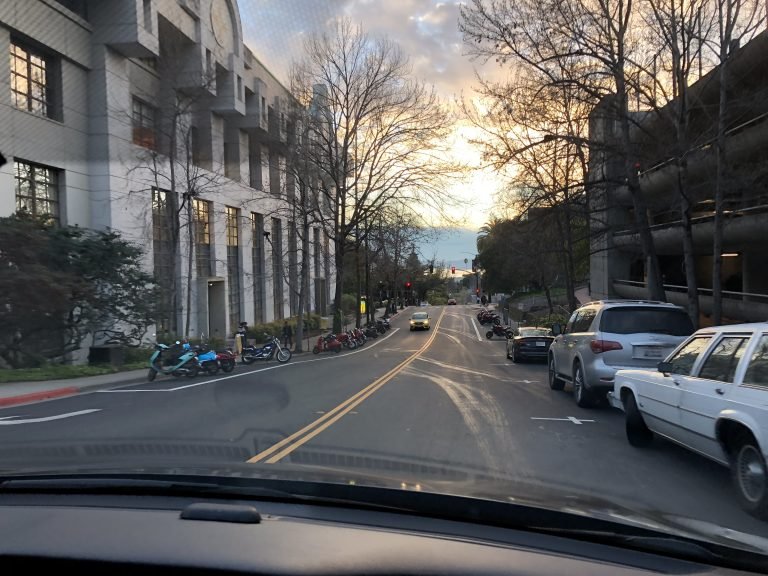 Our food buffet, which was a really nice way to gather for more conversation after the talk:
Our food buffet, which was a really nice way to gather for more conversation after the talk: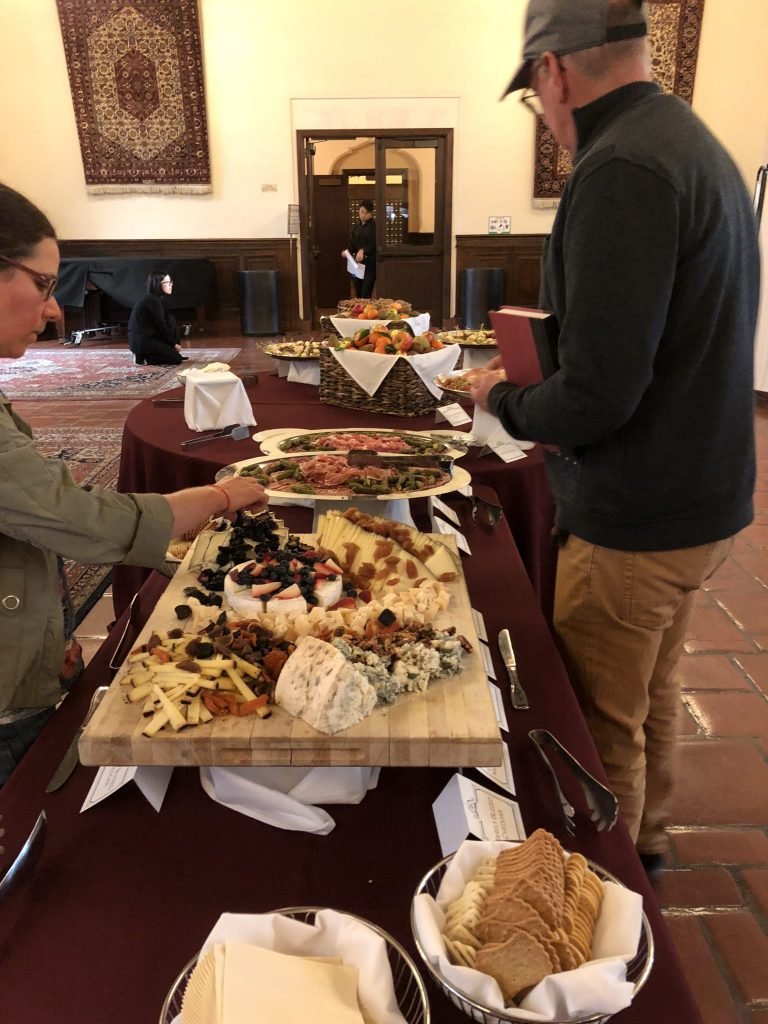 The three most brilliant women on the planet with regards to building a safe and healthful food system. From left to right: the doctor from UC Berkeley School of Public Health, Alice Waters, Marion Nestle, Ph.D.:
The three most brilliant women on the planet with regards to building a safe and healthful food system. From left to right: the doctor from UC Berkeley School of Public Health, Alice Waters, Marion Nestle, Ph.D.: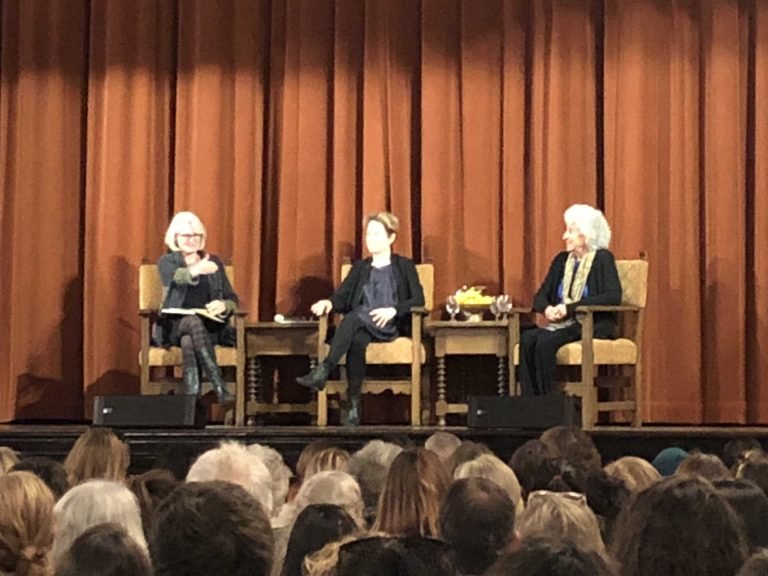 View of the audience from my seat:
View of the audience from my seat: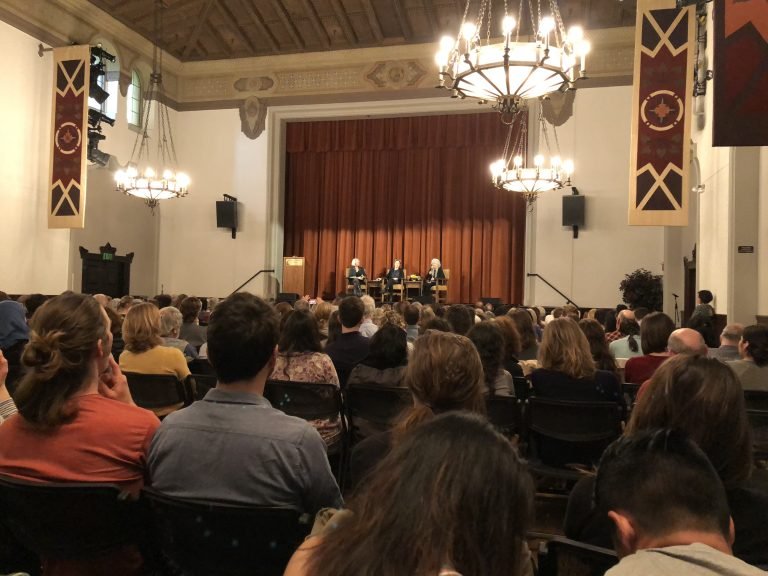 Pano photo of the reception room. I love the UC Berkeley campus!
Pano photo of the reception room. I love the UC Berkeley campus!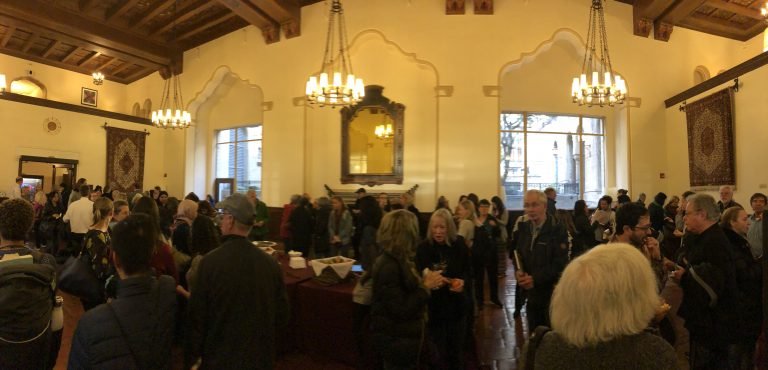 Myself with Alice Waters:
Myself with Alice Waters: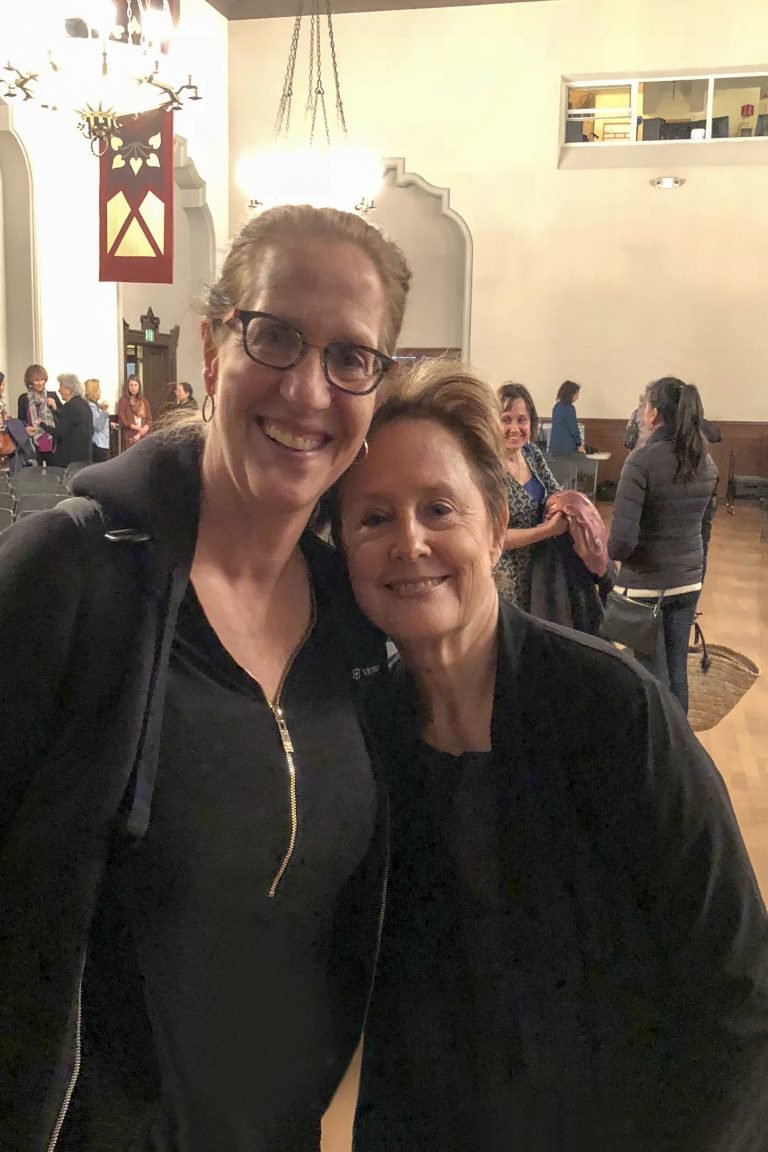 So now you have great information, more resources to read, and a strong motivation for promoting local foods and sustainably grown produce plus hopefully a desire to keep teaching your employees, clients, and students how to cook. It is all worth it. Remember the story of the awakening by Marion and Alice and bring it to your clients.
So now you have great information, more resources to read, and a strong motivation for promoting local foods and sustainably grown produce plus hopefully a desire to keep teaching your employees, clients, and students how to cook. It is all worth it. Remember the story of the awakening by Marion and Alice and bring it to your clients.
My own awakening was when I was young and got to pick all the fruits and vegetables in my grandmother's huge garden and then help her cook them into a beautiful meal in her kitchen. There is something magical about digging up a potato out of the dirt and turning into mashed potatoes.
What was your awakening with food?
